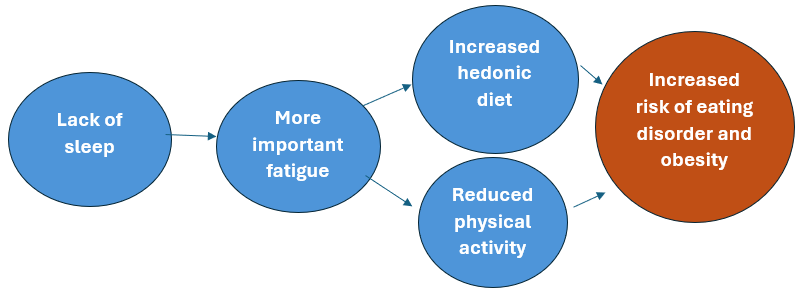Link between sleep, disorders and obesity
Source : Nutriactis/Rouen-Normandie hospital
Sleep plays an essential role in our health and well-being, and it’s recommended that adults sleep at least 7 hours a night. Sleep influences various physiological mechanisms, such as the immune system, energy homeostasis and hormone signaling. The notion that adults are sleeping less than they used to is often widespread, but there is little evidence to support this claim. However, it would appear that sleep quality has been impacted over the years.
Several studies have highlighted the harmful effects of a reduction in sleep duration and/or quality, with in particular, an increased incidence of obesity. In fact, a positive association has been between short sleep duration and increased caloric intake associated with an increase in the energy density foods consumed.

Following sleep deprivation, brain-imaging data showed an increase in central neuronal responses to the sight of energy-dense foods, which may justify justify increased caloric intake. Furthermore, one study highlighted a decrease in leptin levels (18%) and an increase of ghrelin levels (28%) after only a 2-day sleep restriction; these hormonal alterations also justify the increase in caloric intake associated with sleep deprivation.
It would also appear that the time of going to sleep also influences the onset of obesity and hyperphagia by modifying eating habits. Indeed, the later a person falls asleep, the more likely he or she is to snack after dinner and skip breakfast (see Nutrition factsheet). What’s more, insufficient sleep inevitably leads to fatigue and, by extension, a reduction in physical activity and an increase in a sedentary lifestyle, favoring obesity (cf. Physical activity data sheet).
- Energy homeostasis: state of equilibrium between the body’s food intake and energy expenditure.
- Hormone signaling: all hormonal mechanisms
- Leptin: Hormone stimulating satiety
- Ghrelin: Hormone stimulating appetite

Although many arguments point to the probable role of sleep disorders as a risk factor for obesity, some studies have also pointed to obesity as a major cause of sleep disorders. Indeed, sleep disorders are a common complication of obesity, and may contribute to pathogenesis by exacerbating obesity-related complications. Moreover, a 6-unit increase in body mass index is associated with a four-fold increase in the risk of Sleep Apnea Syndrome.
It is therefore essential to analyze and treat sleep disorders in the general population in order to prevent the risk of obesity, but also to include the management of these disorders in obesity.
